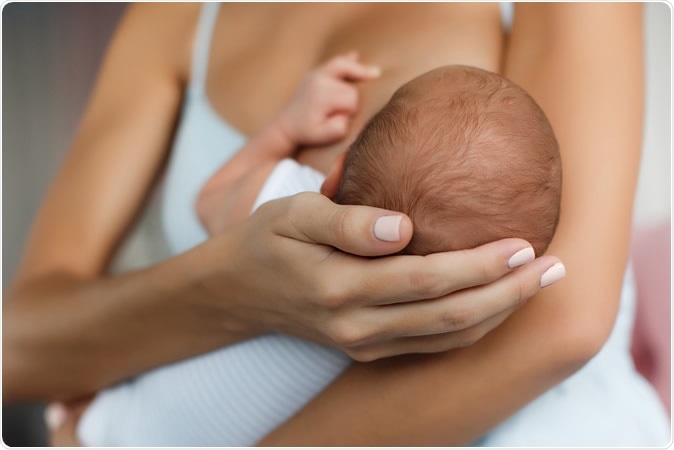A new study published in the journal JAMA Network Open reports that early menopause is less likely to happen in women who have had one or more pregnancies that went beyond 6 months, and in women who nursed their babies. Exclusive breastfeeding was associated with the lowest risk.
Pregnancy and breastfeeding are known to be natural inhibitors of ovulation, the process whereby women release one egg in each menstrual cycle so that they can conceive. The arrest of ovulation may cause the natural disappearance of egg-producing ovarian follicles over time. This in turn delays the point of natural menopause beyond 45 years, which is the definition of early menopause.
The problem with early menopause is that it deprives the body of much-needed estrogen and other female hormones which are essential in reducing the risk of heart attacks, strokes and other cardiovascular events, as well as of dementia and osteoporosis.

Image Credit: HTeam / Shutterstock
The study
The researchers drew data from the current Nurses’ Health Study II cohort, which began in 1989. They included over 108,000 premenopausal women aged 25 to 42 years and had an 85% to 90% rate of response.
They recorded the initial number of children for each woman, whether or not she had attained menopause, and her age. These parameters were reassessed two-yearly. Breastfeeding was enquired about according to the study design, three times over the whole follow-up period. All women were followed up until they reached menopause, crossed the age of 45 years, had their uterus or ovaries or both removed, died, were diagnosed with cancer or could not be located for follow-up.
The findings
Researcher Christine Langton says, “In our study, women with three or more pregnancies who breastfed exclusively for a total of 7 to 12 months had about a 32% lower risk of early menopause compared to women with the same number of children who breastfed exclusively for less than one month.” This is also supported by other studies showing the benefits of exclusive breastfeeding peak for both mother and infant at 6-12 months.
In addition, women who had conceived twice and three times had a reduction in risk of early menopause of 16% and 22% respectively. The lowest risk was among those who breastfed exclusively for 7-12 months and had delivered three or more babies.
Implications
The researchers do not claim a clear-cut dose-response relationship for breastfeeding and menopause, but they point to the biological plausibility of the proposed mechanism of delayed menopause by longer breastfeeding.
Exclusive breastfeeding leads to more frequent and more abundant feeding episodes which leads to an increase in the amount of breast milk produced. This causes a fall in the secretion of FSH and LH but higher prolactin secretion. These interact to make the ovaries more resistant to the ovulation-inducing effects of FSH and LH. On the other hand, it could also be that the mechanism has more to do with slowing down the rate at which ovarian follicles disappear spontaneously without ovulation.
The study appears to be unique in its prospective design, helping to tease out a link between breastfeeding and risk of early menopause. There has been only one study so far that examined how the number of children was related to the risk of natural early menopause. The large size of the study and the long follow-up period of 26 years add to the strength of the findings.
Langton explains further, “Also, at baseline we limited our study to women who were premenopausal, which is a key point.” They also made sure to compensate for multiple confounding factors.
“Our breastfeeding findings not only add new insight into ways to prevent early menopause,” she points out, “but they align nicely with recommendations of both the American Academy of Pediatrics and World Health Organization that US women exclusively feed their infants breastmilk for at least six months and continue breastfeeding for up to one year.”
Journal reference:
Langton CR, Whitcomb BW, Purdue-Smithe AC, et al. Association of Parity and Breastfeeding With Risk of Early Natural Menopause. JAMA Netw Open. 2020;3(1):e1919615. doi:10.1001/jamanetworkopen.2019.19615, https://jamanetwork.com/journals/jamanetworkopen/fullarticle/2759124